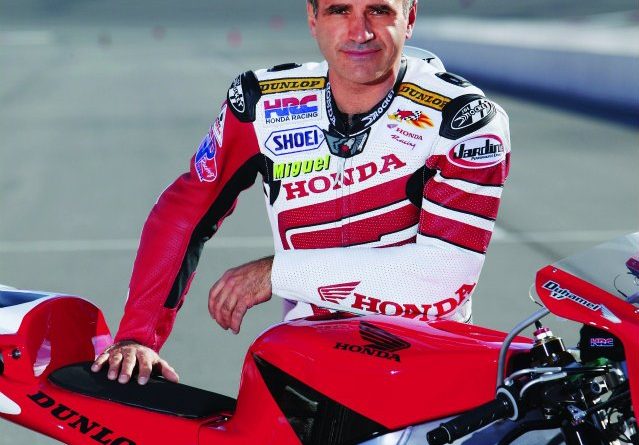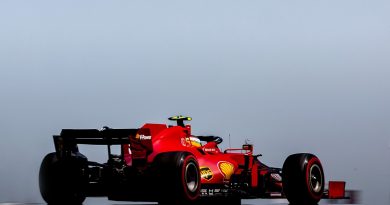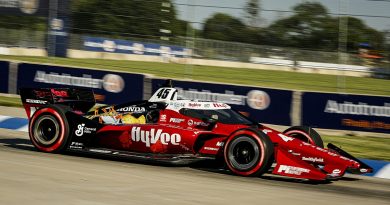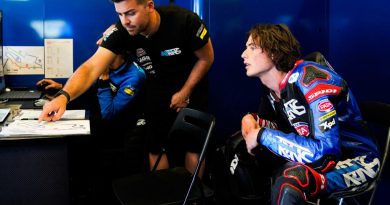21 In ’21: Miguel Duhamel, The Miracle Man
The following is the 13th in our “21 In ‘21” series that highlights one of the 21 AMA Superbike Champions each week as we move through the 2021 MotoAmerica season – the 45th year of the premier class championship.
When people think back to Miguel Duhamel their minds likely wander back to 1999 and Daytona International Speedway. Duhamel, who truly was tougher than a $2 steak, was recovering from a badly broken leg when Daytona rolled around in March of 1999. He showed up in Florida looking gaunt and walking with the aid of a cane. When it was time to throw his leg over his Hondas to go on track, his team had to pick him up and lift him onto the bike. We all watched in amazement. Maybe he could score a few points before moving on to the following rounds where he would be healthier, we thought.
We were wrong.
Duhamel went out and won the 600cc Supersport race. And then he went out and won the Daytona 200. If he wasn’t already a legend, he became one that week at Daytona.
Only three riders (Mat Mladin, Josh Hayes and Cameron Beaubier) have won more AMA Superbike races than Duhamel. One of the most popular and dominant riders in the history of the series, the French Canadian won 32 AMA Superbike races in his career, earning his lone AMA Superbike Championship in 1995. In winning the title, Duhamel became the first Canadian to win an AMA Superbike title.
Duhamel could ride any motorcycle and ride it well and in most seasons he did double duty, racing in both Superbike and Supersport at every round. The rewards were worth the effort as in addition to the 1995 Superbike title, Duhamel won five AMA Supersport Championships and two AMA Formula Xtreme titles. In total, Duhamel won 86 AMA races in his career. No one in history has won more than that. And did we mention that five of those came in the Daytona 200?
In addition to a stunning AMA career, Duhamel also fared well during his brief time in 500cc Grand Prix racing while also winning World Endurance races along the way.
It’s Duhamel’s AMA career that stands out as he raced against the very best in what truly was the heyday of the series.
“It was the pinnacle,” Duhamel said of his era of racing. “Everybody was all in. Kawasaki, Suzuki, Yamaha, Honda, obviously, and Ducati. We were all going at it. The caliber was fantastic. It was just a great time to be there. Smokin’ Joe’s were our sponsors and they were really great and supportive of us. It was a really great time. Those were the great times where the throttle… when the wrist was the real thing. This was how you communicated with the bike and tried to take a gamble, ride a little less hard and hopefully it will pay off in those last five laps coming in. There were guys that when they were on their game – you talk about Doug Chandler and Larry Pegram and guys like that. They were smart racers. They came up from dirt track. Mike Hale, of course, had a terrific season that year (1995). I’m kind of proud to say that everybody I’ve been teammates with I’ve been friends with. I try to be friends with everybody. It’s a sport. We all want to win. Let’s have some fun doing it.”
Ultra-competitive in everything he takes part in, it didn’t take much to get under Duhamel’s skin and further motivate him to beat you. He’d use anything he could to add fuel to the flame and he used that sort of motivation in 1995 to win his
Superbike title.
“We got on a streak,” Duhamel explained of his championship-winning season. “We had a start to the season that was a little tough. Mike (Hale) was becoming the number-one rider because he won at Pomona. I was fine with that because we didn’t have enough parts for two number-one guys. Whoever got the best parts was Mike because he was winning. I was all right with that. The season all changed for me at Laguna Seca when I finished second to Mike in the 600 (Supersport) race. I thought, ‘That’s fine. Smokin’ Joe’s one and two, same team.’ We had a great race. I wasn’t going to stuff my teammate and take a chance of running something off. He was riding so good. I had to make a big move and I was like, ‘Why would I? We’re friends. Same team, same everything.’ So, I came in second. I took second. I’m like, ‘all right. Take one for the team a little bit.’ Like I said, Mike deserved it. He won. He was riding great. The team reacted like I wasn’t there. When I came into the pits, it was like riding for Harley. They forget I was there. Sometimes they did at the beginning. I was just like, ‘What’s going on, guys? We got one and two. Why is that one more important than my two?’
Duhamel took it personally and it ignited him. He had won the 600 Supersport race at Daytona (of course) with Hale winning the next two at Pomona and Laguna Seca. He would then win six in a row to take both titles.
Duhamel puts the Smokin’ in the Joe’s on the exit of turn one at Daytona.
“It just changed my whole frame of mind for that year. I said, ‘Okay, this is how it’s going to be. You like winners? Well, let’s start winning.’ I won every race until the last one at Phoenix. I won seven in Superbike. I won seven in 600. Different race weekends. There were no doubleheaders back then. Different weekends, different tires, different temperatures and all that stuff. So, that has a lot of value to me still to this day. On the 600, I kept winning until the next year and set a record there that hasn’t been touched either. In those times, I was pretty impressive. It’s the only time – my dad came into the team room, and I think it was one of the only times that he came in. He said, ‘You know, Miguel, nice race. You did good.’ Usually he’d be like, ‘Why didn’t you try to pass him? What were you thinking?’ We always wanted to win. For once he was a good sport and he comes in. ‘Nice race, Miguel.’ I’m just… I’ll stop what I said exactly to my dad because I was talking to him. I wasn’t mad at him, but I unloaded on him exactly what I said, in a less nice feature. I said, ‘That’s that.’ My dad was like, ‘Okay.’ And then we went out and won both championships. It was just a great year. It was nice.”
Duhamel leading the way over a who’s who of AMA Superbike racing at Road Atlanta. Chandler, Mladin, Gobert, Yates, Picotte, Corser, Bostrom, Hacking, Hale, Stevens…
One race from the 1995 season stands out from the others in Duhamel’s mind – Sears Point.
“Sears Point was a hard race, a lot of competition there,” Duhamel said. “I knew that if I won that race, I thought I was tying Wayne (Rainey for wins in a row). I think I either tied him or I beat the record, because that was a big thing for me. People were talking about it. Before, I was just focused on winning the championship, winning races like I usually am. I’m like, ‘wow, Wayne Rainey. I’d love to at least be able to tie that record. It’s an honor.’ If I beat it, great. When I won, I remember the celebration. I was so pumped. I was like, if everything goes bad from here on in, at least I established that and I did that. Got my name beside Wayne’s. Such a legendary man. Wayne is a great man, as you know, of course. Most spectators, it’s true, guys like Kevin Schwantz, Wayne Rainey, we might not all get along. We’re racers and stuff like that. We generally do. We are what you see. There’s not a whole lot of faking. So, it’s fun to see good guys win. I was a big fan of Wayne all the way in his career winning championships, and Kevin (Schwantz) and all those guys. It was fun when I saw them and raced against them and stuff like that. Back to beating Wayne’s win record and doing it with the 600 also. The competition in there was so stout, it was good for all the manufacturers. They sold a lot of motorcycles.”
When Duhamel raced, there was no such thing as spec tires, the grids were packed with talent, and there was a lot of money to be made. Duhamel was in the thick of it all, year after year. He looks back on it all favorably, including his trips overseas to do battle.
“I maybe didn’t soak it in as much as I could because I was so focused on racing, but I’m so fortunate that I traveled so much,” Duhamel said. “I went to France. Met tons of great people in France. The first time I didn’t, so I hated France, but as you grow up and you travel more, that was just an unlucky first trip. When I went to France, they were just mean to me. Then I kept going back and different people, and then everybody was awesome. There’s great people everywhere. You can’t judge a whole country by a few you meet. I went to Japan, Malaysia, when I raced in GP in ’92 and did that series. Unfortunately, only went to one track that I knew which was Suzuka. I was top three until I tipped over, against Mick Doohan and Doug Chandler and John Kocinski and Wayne (Rainey) was up there. The whole gang was there. ’92 was a big year. It was stout again. To answer your question, I think the traveling. I got to see the Eiffel Tower and stuff like that. Today, some people are like, ‘I want to travel there,’ and I’m like, ‘I’ve been there. It’s nice. You should go.’ And, by the way, it was paid for because I was racing… On top of it, I was doing pretty well, so you get the “in” crowd with the back-door service to the restaurants and the clubs and certain things like that. So, it’s really nice. I soak it in every day.
Duhamel came within five points of defending his AMA Superbike Championship in 1996, but that ultimately went to his rival Doug Chandler. The big blow to Duhamel’s title run was a huge highside exiting turn two during the race at Laguna Seca, a race that Chandler would go on to win, and a DNF at Brainerd that was won by Italian Alessandro Gramigni. Duhamel did, however, manage to successfully defend his Supersport title with six wins from 10 races while adding four Superbike wins to his career tally.
“In ’96 we had the championship pretty much wrapped up, but what happened there is Doug Chandler did three laps at Brainerd and there were only 15 guys that signed up, so you got points for 15th or 14th. His bike blew up right away. I spectacularly crashed out of turn two at Laguna Seca and set my bike on fire. Still to this day not too sure how that thing got so violent, but I got zero points there because Laguna is such a big motorcycle community. There was like 34 bikes, and I didn’t get any points. Fast forward really quick at Sears Point, one of my favorite racetracks. My shifter fell off with three laps to go, and that’s pretty much what sealed the deal there. We could have been talking about two championships, but it’s racing. It was spectacular and we put on a good show. I had a lot of great fans. I’m pretty happy about the whole thing.”
Okay, let’s back up to that week in 1999 in Florida that made him a hero.
“When I broke my leg in ’98 and then won the ’99 Daytona, both classes,” Duhamel said. “To this day, that was beyond even my wildest dreams and expectations – and I have pretty wild dreams. I never thought I would pull that off. Actually, when I won the 600 (Supersport race), I thought the pressure was off. I could actually go home now. I did more than what I should have done. I was just there to score points, and that was just amazing. A lot of people mention Daytona, the broken leg thing. Some fans really appreciate that no matter how bad the day was going, because I had a few bad days, I was still taking time with the fans. The only thing as far as racing goes, I tossed the idea around for a while there. I go, I wonder if I just do one more year? Real shoestring budget. I’m not going out to win anything. I’m going to race. If it rains, I might not race. But I want to be there in that presence and just sign all the autographs, the few I missed. I know I missed a few. And talk to the people and make it more of a farewell tour. I always wanted to do something like that, because without the fans, as you know, there’s no racing. They bring up a lot of the good stuff. The fight with Jake (Zemke)… They want to know the inside scoop. ‘Are you guys really friends?’ I’m like, ‘Yeah, we’re still friends. I’m going golfing with him.’
So, where are we in your life then, Miguel? Racing is over. It’s been over for a number of years. Where do we find you? Are you working? Are you retired? What occupies your days now?
“My main goal of racing, because it’s a career option that’s very difficult, as you know…” Duhamel said. “And dangerous. I had my fair share of skin left on racetracks here and there – was to put everything into it so I could do nothing. I’m a really big fan of doing nothing, and if that’s your goal, then you accomplished your goal. So, I try to do as least as possible. I’ve got a membership at Bear’s Best Golf Course. I love it there very much. I play golf. I’m old, and I’ve got older guys that are retired, so we get to play a lot of golf, which is impeding on my side thing on Strava, but I still get out there. I love to do those things. I try to do the things I love and not the things I don’t. Although, dieting is one of them I’ve got to keep on because the scale is mean.”
People have always questioned Duhamel’s age. So here goes: How old are you? What year were you actually born? I have books that say one year. You were born in ’66, ’67. One year you’re born in ’69. Can you finally reveal to us, the audience, how old you actually are officially, or are you going to dodge the question again, sir?
“No. It’s simple. It was a great number. I was born in 1983. I’m relaunching my career. I’m pretty young still. It was a dumb thing. My dad was talking to Giacomo Agostini. I love to give the inside ball to the fans and the people, but my dad was trying to get me a GP ride. I was racing a 250 that was not that great, but it got great with John Lassak (his tuner). I just failed to qualify in the 250 GPs, back in the days with all the tires and everything, so if you didn’t have the right sponsorship in tires, you’re not doing nothing. Agostini goes, ‘Your son…’ He (my dad) goes, ‘Help my boy, Giacomo. Come on.’ They knew each other. He goes, ‘He’s too old.’ Back then I was like 20. I’m like, ‘He’s too old?’ So, when he said that and we were talking, we were like… I was doing pretty good. I might have been 19. In our amazement of stupidity, I would have to say, we sat together, me and my manager Alan Labrosse and we said let’s make ourselves younger. Now, we didn’t go 10 years younger. We’re not a blue team. When some people cheat, they go big, and it really pays off for them. But I decided to go one year less, because I was one year too old. So, I’m like, ‘hey, let’s just fix that problem.’ So, not a good liar, not a good cheater. I said it was ’68, but it’s ’67. My birthday was just the 26th of May. I just turned 54.”
Well, happy birthday.
“Thank you, man,” Duhamel said. “Then I played it up. It was so dumb. I didn’t want to tell anybody, so I just kept playing it up over the years. It was a lot of fun with you guys and the journalists. It kept it interesting.”




